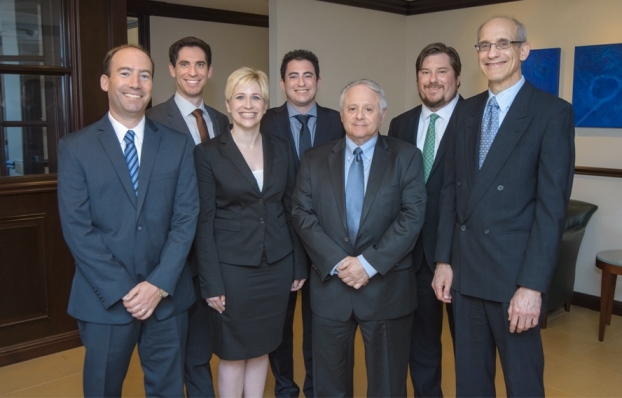Franchise 101: Supreme Tax Implications; and Class NOT in Session
 Southern California Tier 3 Best Lawyers in Franchise Law 2018 bkurtz@lewitthackman.com
Southern California Tier 3 Best Lawyers in Franchise Law 2018 bkurtz@lewitthackman.com
dgurnick@lewitthackman.com
tgrinblat@lewitthackman.com
swolf@lewitthackman.com
msoroky@lewitthackman.com
kwallman@lewitthackman.com
tvernon@lewitthackman.com
June 2018
Rising Stars in Franchise/Dealership Law
Congratulations to Samuel C. Wolf and Matthew J. Soroky, both designated Rising Stars for 2018 in franchise and dealership law, by Super Lawyers Magazine. Sam and Matt were first nominated by peers of the bar, evaluated by a third party research team, and then reviewed by a panel of highly credentialed panel of outside attorneys. As few as 2.5% of the original nominees are then named Rising Stars.
Webinar: Ready to Franchise? Here’s What You Need to Know
Franchising is one, key way to expand a business, but it’s not the only way. Those looking to grow their business and expand their brand through franchising should consider their options carefully. In this webinar, Tal Grinblat, Certified Specialist in Franchise Law (State Bar of California Board of Legal Specialization) and Katherine L. Wallman, an 11 year veteran in both corporate and franchise law, will discuss:
- Five Elements of a Successful Franchise System
- Steps to Begin Franchising
- State Registration Requirements
- Franchise Relationship Laws
- And much more…
Attorneys and Accountants attending this webinar may be eligible for CLE or CPE continuing education credit. Please add ESQ or CPA after your last name in the registration form if seeking credit. Click RSVP to register for this event.
FRANCHISOR 101:
Supreme Tax Implications

On June 21 the U.S. Supreme Court reversed prior case law and let states tax online retailers that do not have physical presence in the state. The ruling also has significant implications for franchise systems that sell products and franchise their brands in multiple states.
Online retailers Wayfair, Overstock.com, and Newegg do not have a physical presence in South Dakota. They challenged a South Dakota law that requires out-of-state retailers to collect and pay sales tax “as if they had a physical presence in the state.” The Court’s precedent held that whether an out-of-state seller had to collect and pay taxes on sales to the state’s consumers depended on whether the Seller had a physical presence in the state. The Court upheld state taxes if they: 1) apply to an activity with a substantial nexus with the taxing state, 2) are fairly apportioned, 3) do not discriminate against interstate commerce, and 4) are fairly related to the services the state provides.
The new decision ruled that physical presence is not necessary. Now the “closely related” requirement applies. The Court acknowledged that requiring physical presence amounted to a judicially created tax shelter. It let businesses operate without physical presence in as many states as feasible to avoid taxes. The Court ruled this was unconstitutionally arbitrary as it treated identical economic actors differently.
Next, the Court said that in today’s economy, virtual presences should be subject to the same sales tax for the same items. Finally, the Court explained that the physical presence requirement was a burden on states’ ability to collect taxes and fund public functions and it put an unfair tax burden on consumers who bought goods in their state. The Court ruled that it was a mistake to give online retailers an arbitrary advantage over competitors that must collect sales tax from consumers. The Court ruled that the South Dakota law did require a substantial nexus before making out-of-state retailers liable for collecting and paying state sales tax.
This decision could lead to states taxing franchisors on royalties from out-of-state franchisees, for the use of marks and intellectual property. This could be a significant financial burden for franchise systems. Franchisors should consult their franchise and tax attorneys on the potential implications of this decision and assess what modifications to their business model and franchise agreements may reduce the impact of the decision. Franchisors might also rethink their e-commerce platforms with regard to granting or withholding rights to franchisees to sell goods out-of-state.
Read: South Dakota vs. WayFair, Inc., et al.
FRANCHISEE 101:
Class Not in Session

In May, the U.S. Supreme Court held that mandatory arbitration agreements containing class action or collective action waivers must be enforced as written.
The challenge to enforceability was that the National Labor Relations Act (“NLRA”) says employees can seek relief on a class basis. The Court examined three appeals involving workers whose employment agreements required all disputes to be arbitrated. The agreements required individualized arbitrations and barred employees from pursuing claims as a class or collective action.
The Court ruled that the NLRA does not override another law, the Federal Arbitration Act (“FAA”). The FAA requires courts to enforce agreements to arbitrate. The Court said the FAA treats arbitration agreements as valid, irrevocable, and enforceable. The Court directed lower courts to respect and enforce the parties’ chosen arbitration procedures and “rigorously to enforce arbitration agreements according to their terms.”
The employees invoked a clause of the FAA that lets courts refuse to enforce arbitration agreements. They claimed the NLRA decreed that the employees’ waivers of class and collective action was illegal.
The Court rejected this argument. The Court interpreted the FAA clause narrowly, stating that it “offers no refuge” for defenses that apply only to arbitration. The Court noted that the aggrieved employees did not claim they were forced to sign the arbitration agreements by fraud or duress or other unconscionability, so there was nothing to render the contracts unenforceable. Instead, the employees objected that their agreements required them to waive rights to class or collective actions.
The Court’s ruling said that lower courts may not let a contract defense “reshape traditional individualized arbitration by mandating classwide arbitration procedures without the parties’ consent.” According to the decision, the FAA required the court “to enforce, not override, the terms of the arbitration agreements before us.”
The Epic Systems case provides support for franchisors whose franchise agreement arbitration provisions prohibit class or collective actions by franchisees. Such provisions may be invalidated only “by an act of fraud or duress or in some other unconscionable way.” Franchisees should pay attention to any arbitration clause in their franchise agreement that bars class actions. Where such a clause is presented to a potential franchisee, it may be worth trying to negotiate the right to pursue class action proceedings against the franchisor.
Read: Epic Systems Corporation v. Lewis
